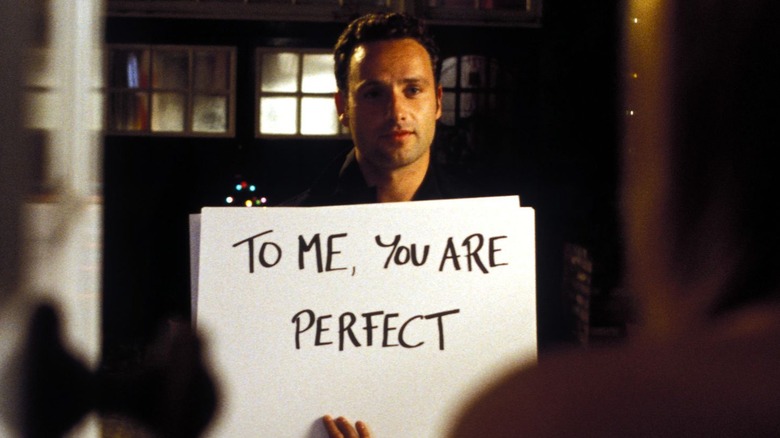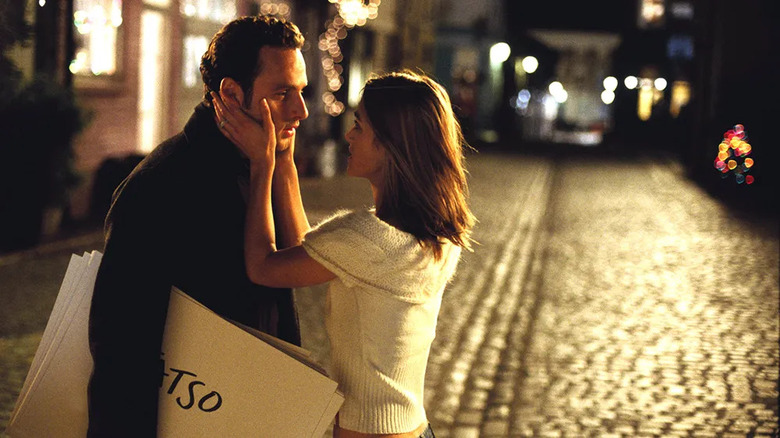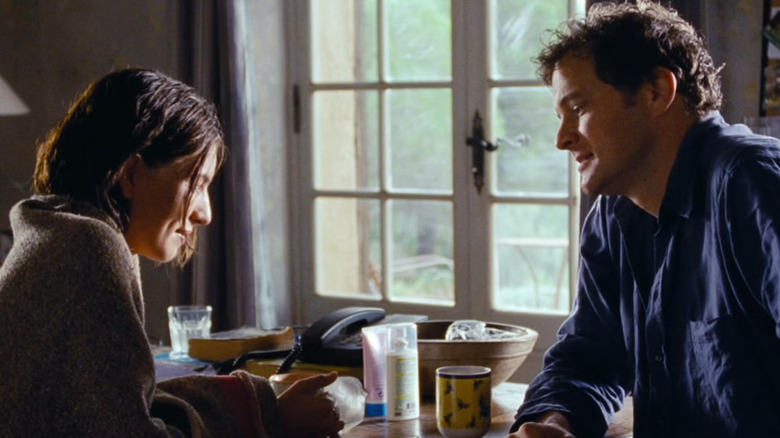Love Actually Director Finally Admits One Controversial Scene Is 'Weird'
Every holiday season, friends and families alike gather to rewatch Richard Curtis' beloved Christmas classic "Love Actually." Despite the film's immense legacy, it's okay to admit that some of the scenes haven't aged all that well. In an interview with The Independent UK, Curtis spoke about one of the film's most controversial and discussed scenes and said that even he thinks it's kind of weird.
"He actually turns up, to his best friend's house, to say to his best friend's wife, on the off chance that she answers the door, 'I love you,'" Curtis said, reportedly laughing and shaking his head. "I think it's a bit weird. I mean, I remember being taken by surprise about seven years ago, I was going to be interviewed by somebody and they said, 'Of course, we're mainly interested in the stalker scene,' and I said, 'What scene is that?' And then I was, like, educated in it."
The scene in question is, of course, when Mark (Andrew Lincoln, "The Walking Dead") stages a silent confession of love at his best friend's home, directed at the man's wife Juliet (Keira Knightley). Armed with poster board and a dream, Mark tells Juliet — whom he has, up until this point, treated somewhat like dirt — that he loves her, and then he leaves ... but not before Juliet kisses him, for some reason.
Nowadays, Richard Curtis understands why people think this Love Actually scene is strange
After all this time, Richard Curtis is big enough to admit that this scene feels completely weird and even acknowledges that people now feel like Mark is basically stalking Juliet. What he does want to say, though, is that it was never intended to be as creepy as it later felt, and it didn't seem that strange at the time.
"All I can say is that a lot of intelligent people were involved in the film at the time, and we didn't think it was a stalker scene," Curtis said. "But if it's interesting or funny for different reasons [now] then, you know, God bless our progressive world."
This isn't the first scene from "Love Actually" that Curtis has re-evaluated as of late. While speaking to his daughter Scarlett Harris — a writer and activist — during a literature festival in England, Curtis admitted that some of the film's body-shaming is completely regrettable. Specifically, the character Natalie (Martine McCutcheon) is frequently referred to as fat. Not only is Natalie a beautiful and normal-sized human woman, but this kind of language is never appropriate, particularly from in-universe staffers who work alongside her for the Prime Minister of England, David (Hugh Grant). "I think I was behind, you know, behind the curve, and those jokes aren't any longer funny, so I don't feel I was malicious at the time, but I think I was unobservant and not as, you know, as clever as I should have been," Curtis told his daughter and the audience.
That's not the only strange scene in Love Actually
At least Richard Curtis is aware of a few of the problems within "Love Actually," but actually, there are a lot of parts of this movie that don't age well. Sure, the idea behind Jamie (Colin Firth) and Aurélia's (Lúcia Moniz) romance is at least noble, in that love has a way of transcending language — Jamie only speaks English, and Aurélia Portuguese. The two strike up a connection despite literally not being able to understand one another, and Jamie ends up learning broken Portuguese to propose marriage to Aurélia, a woman with whom he's never had a real conversation. See? It's not as romantic when you think about it that way.
That's to say nothing of Harry (Alan Rickman) and the fact that he cheats on his loving wife Karen (Emma Thompson) with his all-too-available secretary Mia (Heike Makatsch), or poor Sarah (Laura Linney), who can't open herself up to love in a real way due to overwhelming familial obligations. In the end, perhaps the most wholesome story is that of aging rock star Billy Mack (Bill Nighy) and his manager Joe (Gregor Fisher), whose brotherly love has spanned decades and shows no sign of slowing down.


